Best Sci-Fi Movies of the 21st Century
From missions in space and meditations on the dangers of AI to alien invasions and post-apocalyptic adventures, these are the very best science fiction films of the 21st century so far.
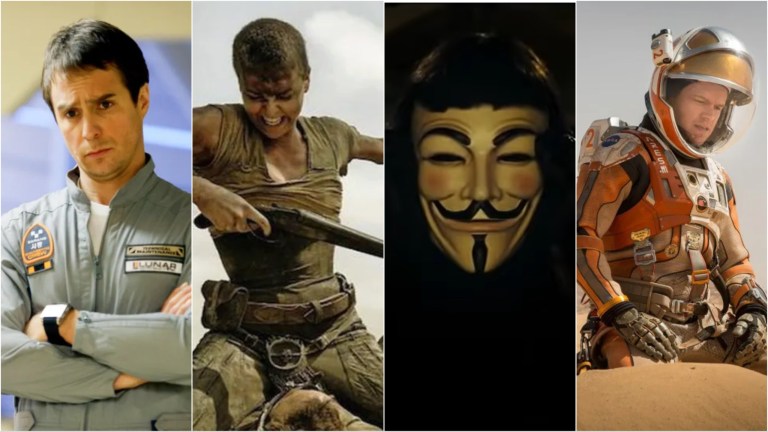
A lot has happened since the turn of the century. We at Den of Geek can certainly attest to that as we’ve seen the movie industry change and grow, embrace streaming, and pivot toward intellectual property. Yet even as our present stays in a constant state of flux, our fascination with the future remains unwavering.
What dreams may come in 15 years? Or 30? Or a hundred as technology evolves and its relationship with humanity is renegotiated?
If you told a room full of geeks 20 years ago that the 2020s would be a world filled with smartphones and tablets, social media-shaped democracies, and something called “TikTok,” they might think you’d written a sci-fi movie. Still in that upheaval, we saw some pretty good science fiction stories come out in their own time, both Hollywood blockbuster big and intimately indie; iconic and underappreciated.
It’s why we’ve polled our complete staff to determine the very best sci-fi movies that have been released in the 21st century so far…
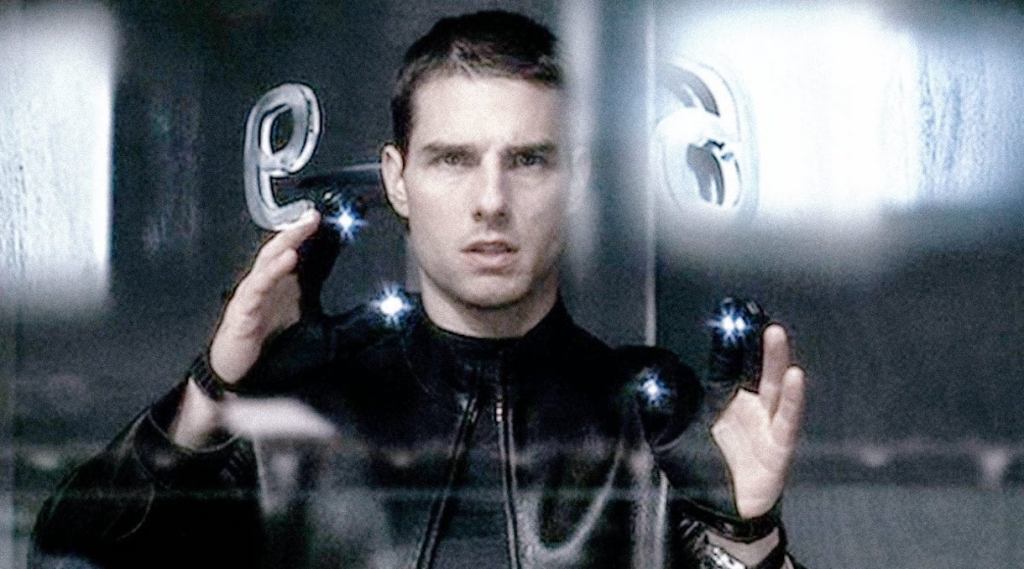
Minority Report (2002)
Spielberg tackles Philip K. Dick in one of the director’s most ambitious works to date. Tom Cruise plays John Anderton, part of an elite unit tasked with preventing murders before they happen thanks to the abilities of mutants known as PreCogs who can see the future. But Anderton finds himself accused of a murder he has yet to commit and must go on the run.
In addition to being a sizzling, highly visceral chase thriller, Minority Report creates a deeply unsettling and immersive near-future world and touches on themes of determinism, government intrusion and media infiltration into our everyday lives — making the movie just as relevant as ever. The only flaw: a triumphant ending that feels almost physically out of place with the rest of the film. – Don Kaye

Signs (2002)
M. Night Shyamalan was at the height of his storytelling powers in the early ’00s after The Sixth Sense and Unbreakable, but it’s Signs that still stands out as his best entry from that era. Although the film is set in the present, Shyamalan’s intimate tale about an alien invasion wants to take us back to the UFO hysteria of the ’50s — crop circles, tin foil conspiracies, panic spread through news broadcasts and gossip, and one truly terrifying sighting that still gives us the chills to think about.
But like all great Shyamalan films, Signs turns out to be about a lot more than little green men. At the center is Mel Gibson’s Graham Hess, a priest who has lost his faith after the death of his wife. It’s through Graham navigating this personal tragedy as well as an unprecedented moment in human history that the film gets into its heavier subject matter: does God exist? And if so, is He actually listening? Shyamalan can’t actually answer those questions for you, of course, he’s not that good. But he does provide his characters with some very captivating evidence. – John Saavedra
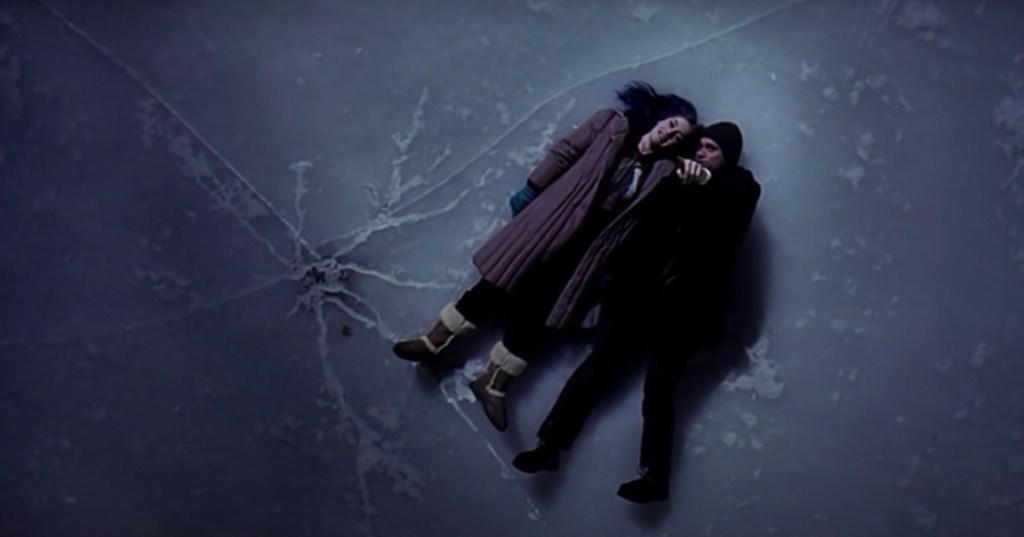
Eternal Sunshine of the Spotless Mind (2004)
This masterpiece is one of many of what I call “hidden” science fiction films — stories in which the sci-fi element, while crucial, is subtly integrated into the contours of what appears to be a non-genre narrative. In this case, the option to have one’s memories erased via a scientific procedure provides the framework for a story about memory and love that is poignant, heartbreaking and profound in what it says about relationships.
Michel Gondry’s fragmentary direction suits Charlie Kaufman’s reverse-engineered gem of a screenplay, while Kate Winslet and especially Jim Carrey are flawless as the emotionally damaged couple who elect to forget each other — even if their memories linger on like messages from a ghost dimension. – DK
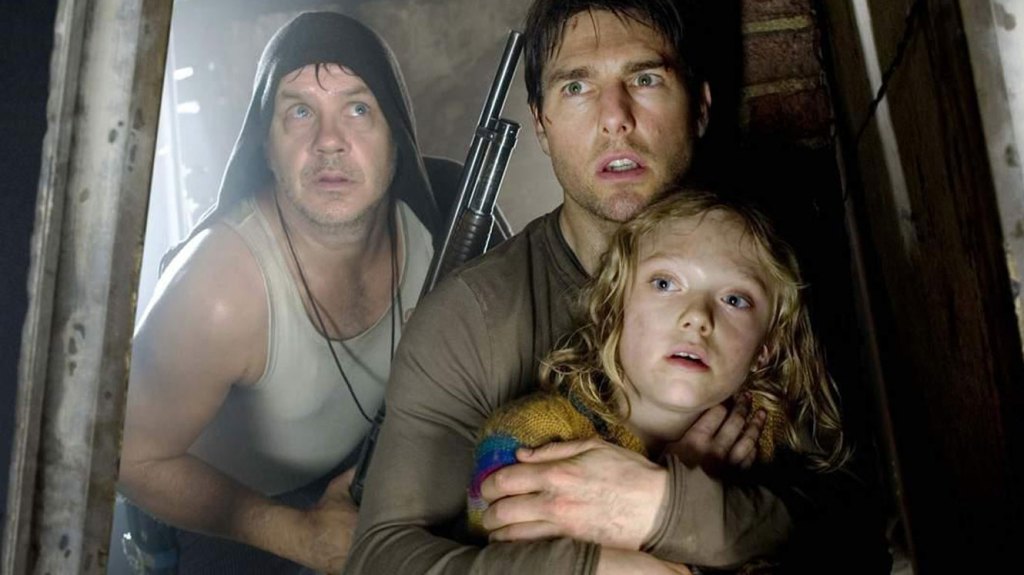
War of the Worlds (2005)
Spielberg’s third sci-fi outing of the millennium proved to be his darkest yet, a modern-day retelling of H.G. Wells’ landmark novel that managed to be fairly faithful to the book (including visualizing the alien tripods close to how Wells described them) while using it as a metaphor for the fear and horror that gripped the country in the wake of 9/11.
Tom Cruise is right on the money as an everyman who deals with forces and circumstances beyond his comprehension, while also taking the familiar Spielberg role of the deadbeat dad. Images from this film — running people being vaporized on the street, a burning train roaring down a track and a nightmarish river awash with dead bodies — are among the most frightening Spielberg has ever committed to film.
And don’t blame him for the abrupt ending — it’s right out of Wells. – DK
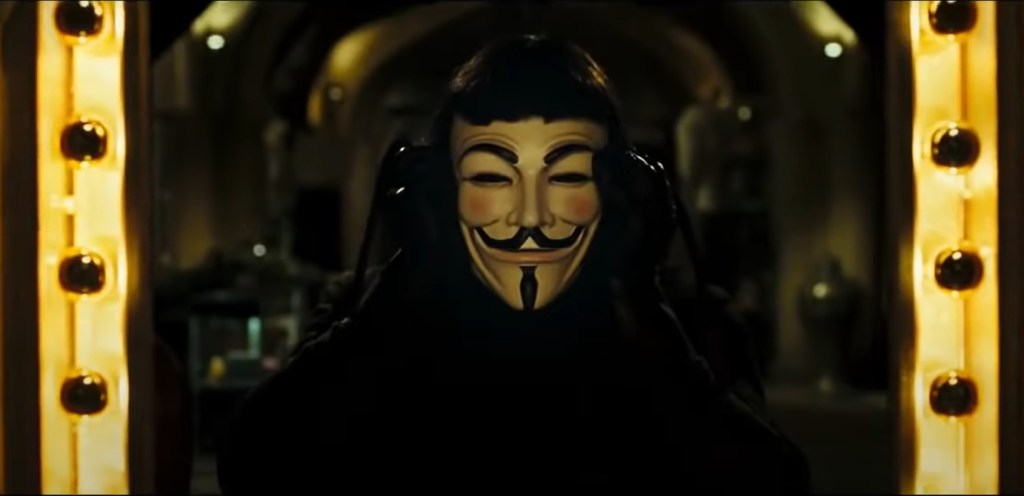
V for Vendetta (2006)
Since as far back as the days of George Orwell and Ray Bradbury, science fiction has been an excellent realm to explore the real-life horror of autocracy, oppressive government, and the erosion of civil liberties. And by loosely adapting Alan Moore and David Lloyd’s V for Vendetta graphic novel, the Wachowskis offered a chilling and effective update of the concept for the 21st century.
Released in the shadow of the War on Terror years, V for Vendetta imagines a UK which has surrendered its liberty due to fear of terrorism and minority groups, and thereby allowed a militant rightwing party to take over. That is until a freedom fighter (or terrorist?) with morally ambiguous methods named V (Hugo Weaving) launches a campaign of civil unrest, and even indoctrinates a scared young woman (Natalie Portman) to his cause. It’s a gripping yarn that unfortunately has even more resonance now than in ’06, and which is powered by two strong performances, plus one of Moore’s all-time great plot twists. – David Crow
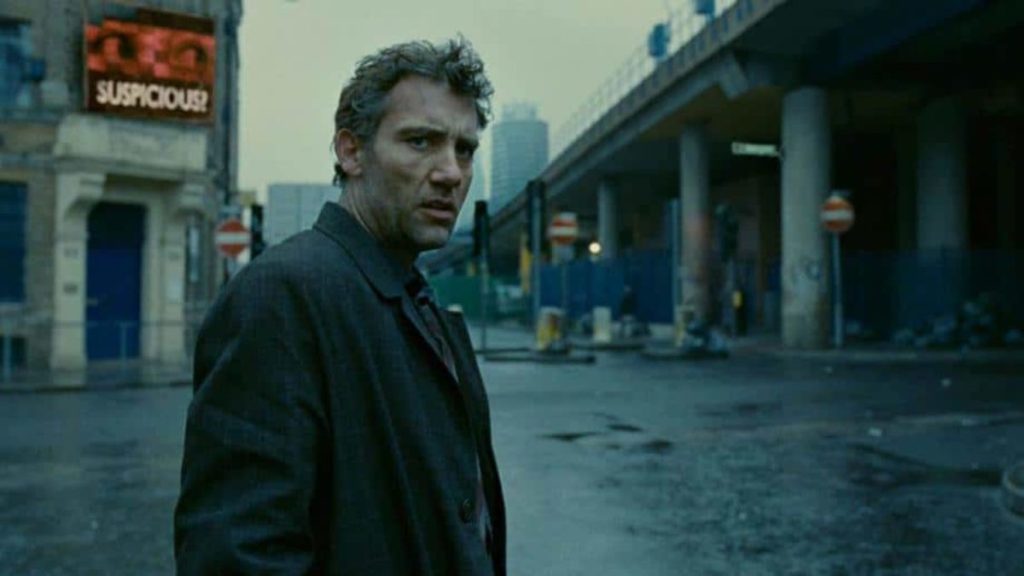
Children of Men (2006)
Despite not connecting with audiences on its initial run, Children of Men is still revered as one of the best films of the 2000s, let alone as one of its best sci-fi efforts. Director Alfonso Cuaron adapts author P.D. James’ book about the slow descent of human society into chaos — thanks to the complete cessation of new children being born — in harrowing, immersive, yet deeply emotional style. Clive Owen has never been better as burned-out civil worker Theo, who must guide a young woman with a secret through the anarchy descending around them in a last bid for hope and survival.
Technically dazzling from its production design to its stunning single-take sequences, full of sorrow, despair, beauty and ultimately faith in human compassion, Children of Men remains a devastating classic 10 years after its release. – DK
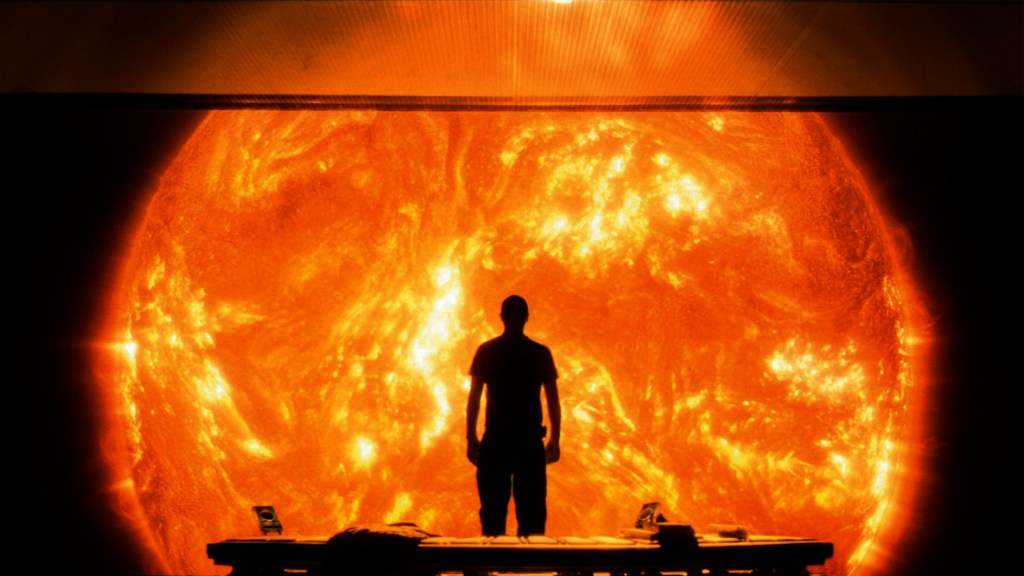
Sunshine (2007)
Ah, poor, perpetually underrated Sunshine. The third collaboration between director Danny Boyle and novelist-turned-screenwriter Alex Garland is a crisp, tense, gripping space melodrama in which a team of scientists must fly to the sun and plant a nuclear device that will help the dying star reignite and save humanity.
The psychological effects of the journey soon lead to trouble. Cillian Murphy and future Captain America Chris Evans top a sturdy cast that manage to eke personality out of their somewhat thin characters, and the visuals and sense of impending dread are top notch. I even like the third act reveal even if some critics felt it pushed the story into slasher/horror territory.
Sunshine borrows quite a bit from films like 2001, Alien, Dark Star, and Silent Running, but mashes them up in a satisfying and occasionally mind-blowing new mix. – DK
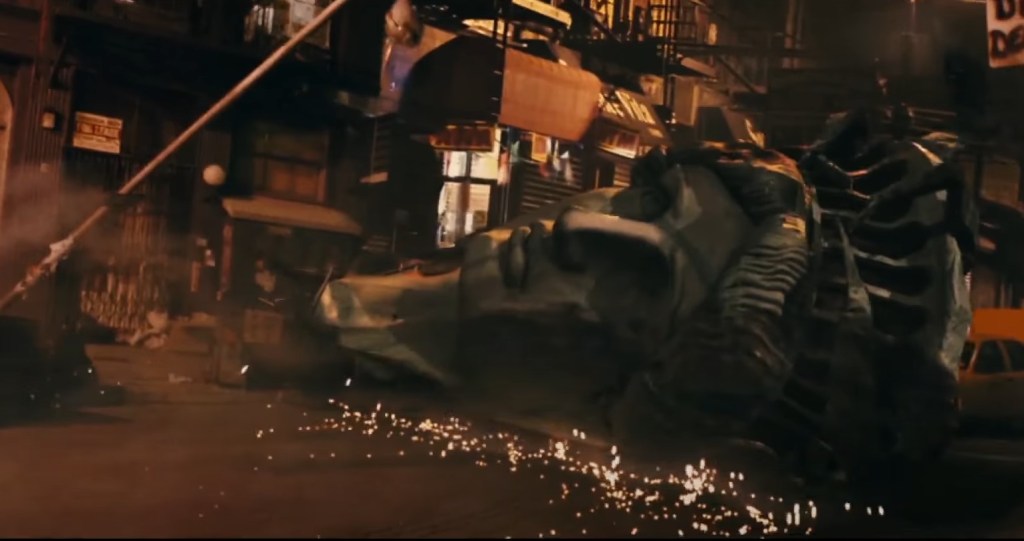
Cloverfield (2008)
The endlessly rewatchable Cloverfield remains the pinnacle of the modern science fiction monster movie. Forget the uneven and more over-the-top franchise it spawned — to be fair, 10 Cloverfield Lane is also great. The original is a remarkably grounded found footage film that tapped into our post-9/11 anxiety, with deft camera work from director Matt Reeves that captures the random chaos that ensues at street level when a giant sea monster decides to visit the big city. Reeves knows when to zoom in on the terror and grief of its subjects but also delivers the big blockbuster shots in the third act you’d expect from a kaiju flick.
Its barebones “save the girl, escape the city” plot gives way to a fast-paced race through a city under siege from a force that initially feels unknowable, making the experience all the more frightening and disorienting. Cleverly, Reeves initially only gives us bits and pieces of what’s going on and what the hell is behind it. The movie knows it doesn’t even really need to show the monster to get the heart pumping — once the Statue of Liberty’s severed head comes crashing down on a street in Midtown Manhattan, everyone knows it’s time to run. – JS
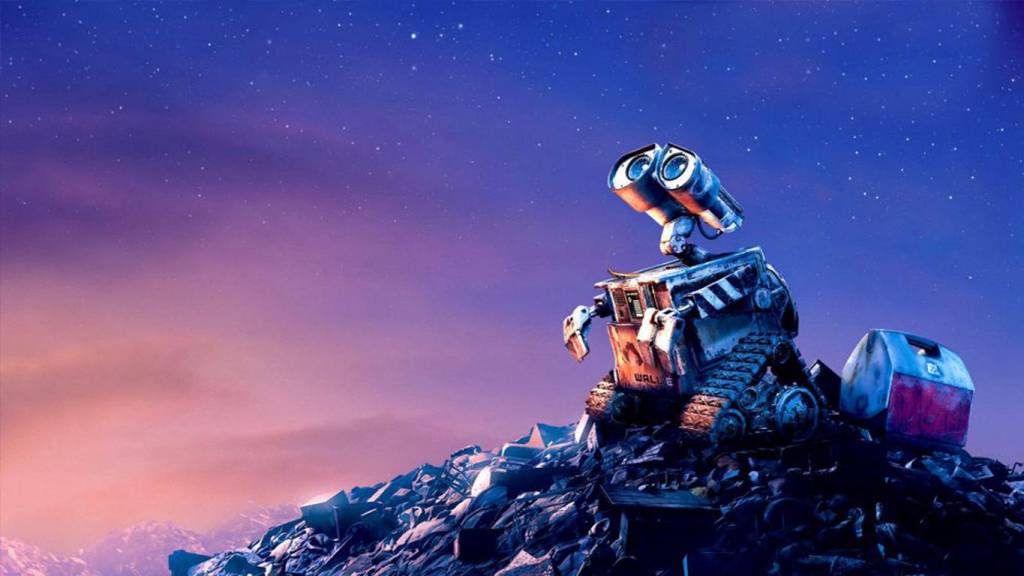
WALL-E (2008)
Imagine, if you will, a future techno-capitalist hellscape. The Earth is trashed. The human race bums around the universe on an antique luxury star-liner run by a misanthropic Autopilot. Touchscreens hover over our corpulent, reclined bodies as we cycle through mindless entertainment options until the fake sun goes back down. Welcome to the grim world of… PG animated family film, WALL-E.
2008’s WALL-E is another win for venerated studio Pixar and a surprisingly scathing social critique. The premise of the movie is simple. What if humanity left Earth and forgot to turn the last robot off on our way out? That question gives way to a remarkable sci-fi adventure story. Amid all the future dystopia is the dogged determination of a little robot with a job to do. Simply by clocking in, crushing his trash into cubes, and being himself, WALL-E makes a compelling case that humanity deserves a second chance. If we can make loveable robots like WALL-E and his sleek love interest Eve, then we really can’t be all that bad, can we? – Alec Bojalad
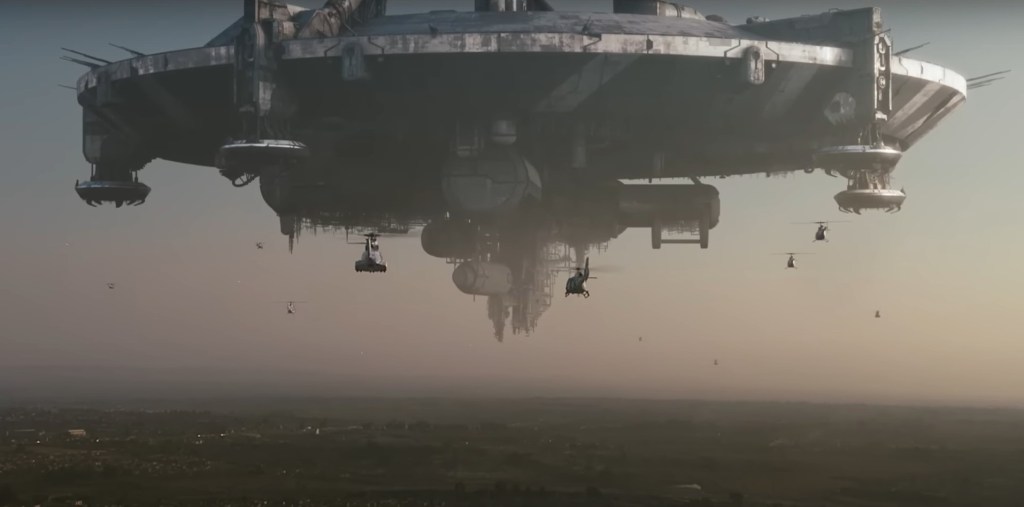
District 9 (2009)
South African writer-director Neill Blomkamp literally came out of nowhere (after working as a special effects artist for a decade or so) with his debut feature, which was produced by Peter Jackson and based on a short that Blomkamp had made a few years earlier. In the film, the inhabitants of an alien spaceship that appears over Johannesburg are confined to an internment camp called District 9. Plans on both sides–by the government to relocate the “prawns” and by the aliens to return to their ship–go awry as the inept bureaucrat (Sharlto Copley) leading the government operation inadvertently begins mutating into a “prawn” himself due to exposure to alien fuel.
Shot in a semi-documentary fashion and relentlessly intense from start to finish, District 9’s reputation as one of the best sci-fi films of the 2000s is well-earned. As with all great sci-fi, the film uses its premise to touch on racism, xenophobia, human (or otherwise) rights, and segregation, with South Africa’s own shameful history of apartheid lurking in the background. Copley, also an unknown until this, gives a superb performance as the tragic Wikus while Blomkamp’s handling of the material is sharp and focused all the way through. It’s a pity he’s never done anything nearly as good since. – DK
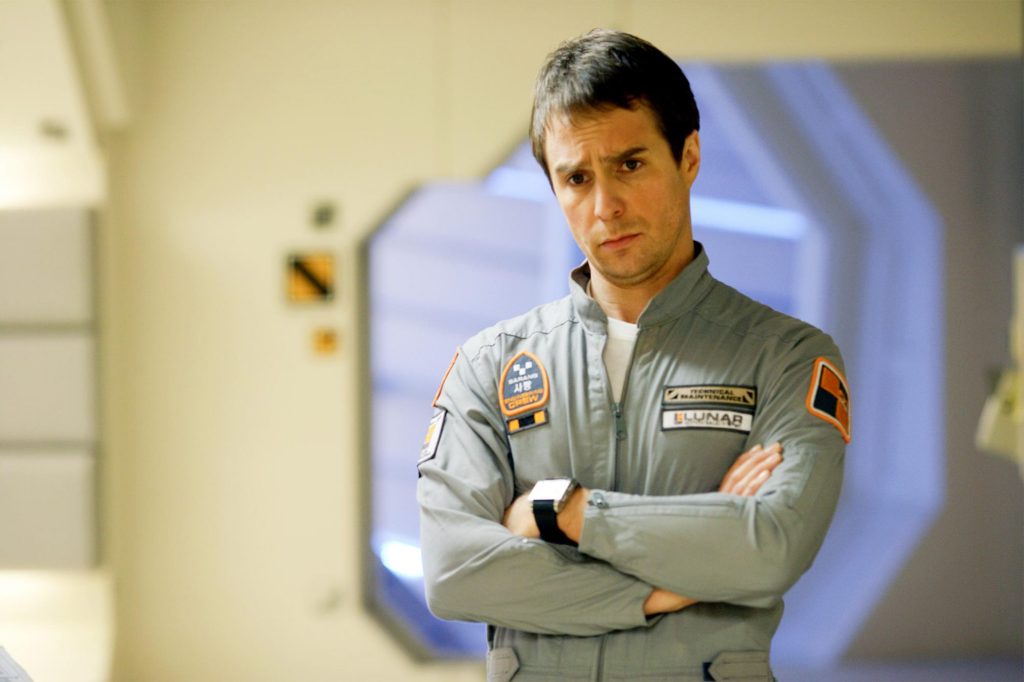
Moon (2009)
Duncan Jones sure knows how to make an entrance. Jones’ 2009 directorial debut is a bleak exploration of loneliness and what it means to be human. Sam Rockwell turns in a brilliant performance as Sam, the sole operator of a lunar mining facility who finds himself suffering from unexplained visions. As it turns out, there’s a lot for Sam to question about the state of his reality, and Moon explores it with a kind of tense, neurotic glee.
Without getting into spoilers, Moon is virtually a one-man showcase for Rockwell with most other characters appearing on monitor screens and as disembodied voices. Like John Carpenter’s Dark Star, the film doesn’t take itself too seriously, until the moments when it does. It’s an unmissable film if you haven’t seen it, and one that, despite its heavier moments, is endlessly rewatchable too. – Mike Cecchini
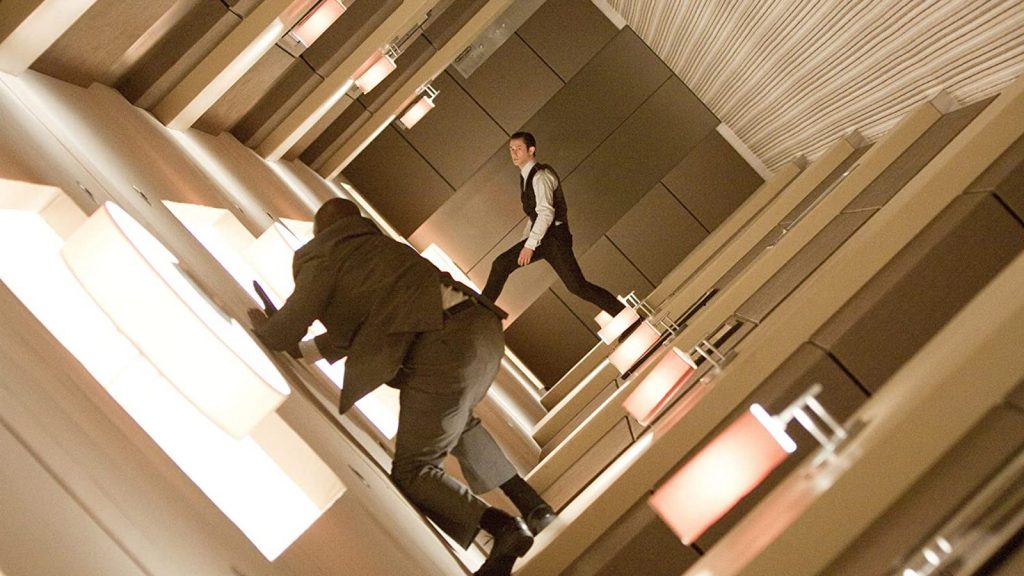
Inception (2010)
Christopher Nolan’s other great sci-fi film from the last 15 years, Inception is less concerned with the hard science that exists about its subject of choice—lucid dreaming—than it is with using “dream logic” as a backdrop to craft one of the most satisfyingly knotty crowdpleasers in recent memory. At the end of the day, Inception is a heist movie that plays with narrative form and structure to fold in on itself, not unlike the cityscapes of Paris during one famous scene.
Something of a cinematic manifesto for Nolan, Inception provides an allegorical mission statement about how a director puts together a crew in order to implant ideas into your little head. The magic of the film, then, is that such airs never feel pretentious or heavy handed. Rather they fade to the background of an otherwise thrillingly robust action movie that never talks down. This one favors to instead ask the audience to keep up as it uses “dream infiltration” to weave a labyrinthine adventure that can be as dizzying as it is visceral whenever a train manifests on a city street or a hotel hallway rotates on a 60-degree axis. – DC
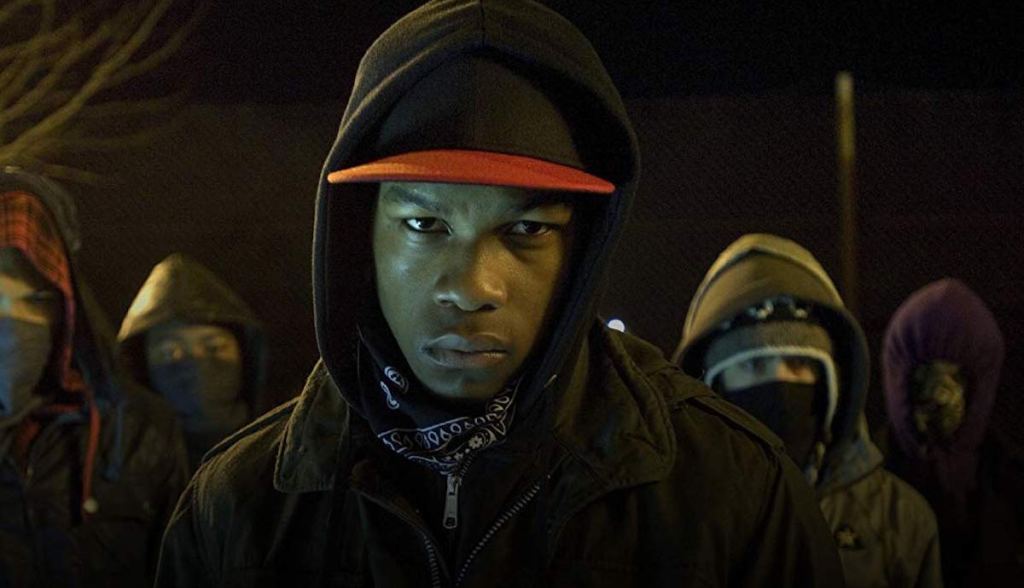
Attack the Block (2011)
The sci-fi film that put future Star Wars star John Boyega on the map is also arguably his very best. Boyega stars as Moses, the leader of a South London street gang that’s out to cause some trouble on Guy Fawkes Night. And oh, do they find trouble when a meteor comes crashing down in their neighborhood. And this is no ordinary meteor, either. When an alien pops out and attacks Moses, the gang chases down and kills the creature, celebrating their victory over its flayed corpse. This is a huge mistake.
Attack the Block turns into a full-blown action thriller from the point on, as Moses, Pest (Alex Esmail), Dennis (Franz Drameh), Jerome (Leeon Jones), and Biggz (Simon Howard) are thrust into the middle of an alien invasion and have to work together to defend their apartment complex from the creatures that have come to kill them all in an act of brutal revenge. A pre-Doctor Who Jodie Whittaker and Nick Frost (Shaun of the Dead) also join the fight. As you might expect, the film turns out to be about a lot more than simply defeating those pesky alien invaders, with director and writer Joe Cornish tackling issues of race and inequity in London’s oft-forgotten communities. The film certainly provides the incredibly talented Boyega with deeper, more meaningful material than the Sequel Trilogy ever did. – JS

Prometheus (2012)
This 2012 return to the Alien franchise from the man who helmed the original movie remains divisive, but Ridley Scott’s Prometheus offers so many incredible visual flourishes and horrifying ideas that it’s well worth a look. Even if you don’t get along with it, you certainly won’t forget its truly upsetting delights.
A prequel to Alien, Prometheus boasts an enviable cast that includes Noomi Rapace, Michael Fassbender, Idris Elba, and Charlize Theron. The film is set in the late 21st century and revolves around the crew of the titular spaceship, who are following a star map that has recently been discovered on Earth. It’s been left there, seemingly on purpose, by an intriguing ancient culture. Some of the crew think the map will lead them to the origin of our species, and perhaps answer some philosophical questions that have often confounded mankind. Of course, when they get to the pot of gold at the end of the rainbow, there’s not much whimsy to be found, but there is a whole lot of body horror and regret. – Kirsten Howard

Looper (2012)
Five years before he wrote and directed modern Star Wars: The Last Jedi, filmmaker Rian Johnson established his sci-fi bona fides on a smaller scale with Looper, which is fit-to-bursting with pure love for science fiction and all of its speculative potential. Joe (fittingly played by Joseph Gordon-Levitt) is a contract killer, or looper, for a 2044 Kansas City crime syndicate. Since tracking technology in the future makes disposing of bodies impossible, the 2074 version of the syndicate sends victims back to 2044 for Joe to take care of. It’s a simple gig, save for that one catch where the 2074 loopers are sent back to be exterminated by their past selves, effectively “closing their loop.”
Joe’s future self is played by Bruce Willis and when it’s his turn in front of the blunderbuss shotgun, he has no intention of going quietly. That’s a strong enough setup for any sci-fi concept, but Looper isn’t satisfied to settle for merely the “would you kill the future version of yourself for a bunch of money” hypothetical. The movie sprawls out into unexpected and fascinating directions, incorporating advanced human biology bordering on the supernatural and making room for a superb Emily Blunt performance. – AB
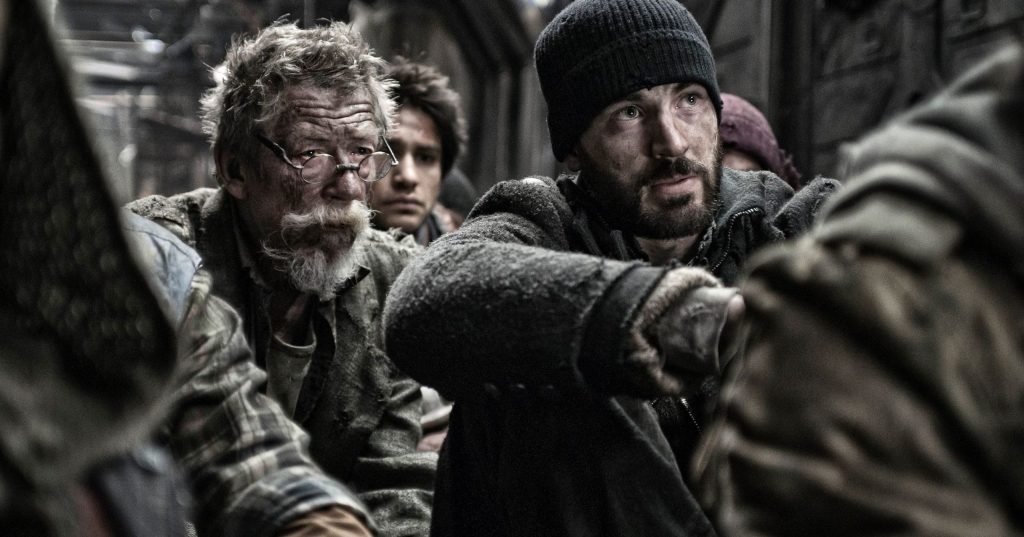
Snowpiercer (2013)
Forget about upstairs versus downstairs drama. Korean filmmaker Bong Joon-ho brutally encapsulates the caste system of capitalist societies with one of the best social allegories in this century. And it’s all about those who get to ride at the front of the train… and those who are consigned to the back. Prior to his Oscar winning Parasite, which removed the genre trappings Bong previously couched social commentary in, the director made a pair of terrific sci-fi movies in the West: Snowpiercer and his underrated indictment of the meat industrial complex, Okja (2017). In the former’s case, he imagines a post-apocalyptic future where the last dregs of humanity survive a frozen wasteland by traveling around the planet at super speeds on a decadent train powered by the “Holy Engine.”
At the front of the train live the rich and leisured who had the money to buy a first class ticket when they let the world burn (or freeze). In the back resides almost everyone else: the working poor told they should be grateful they get to shovel the coal that makes the Holy Engine go while eating their own recycled waste. Among them is Chris Evans (a smart Marvel leading man who used his superhero clout to bet on artists like Bong). He believes if he can lead a revolution, things will change when they’re at the front of the train. But standing between his band of idealists and the fat cats are the middle class bureaucrats, including a wonderfully scenery-chewing Tilda Swinton. Violence ensues, as does the cold realization that nothing ever changes as long as there needs to be a top. As long as someone gets to ride upfront. – DC
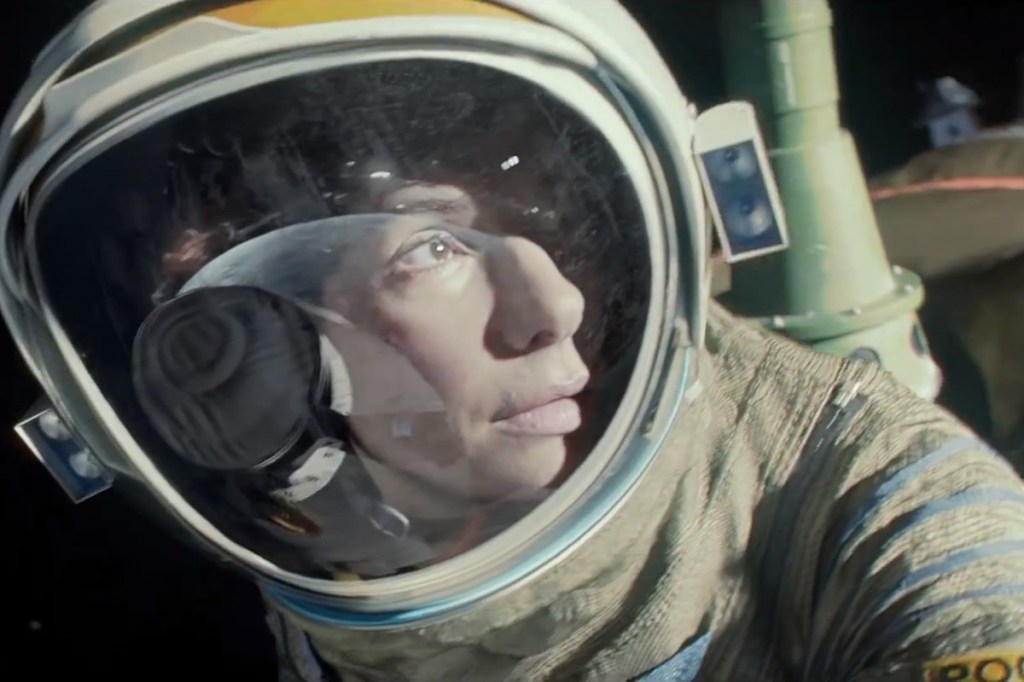
Gravity (2013)
Sometimes it feels like folks have forgotten about Gravity, Alfonso Cuaron’s 2013 sci-fi flick which won seven well-deserved Oscars, including for directing, cinematography, and visual effects. Maybe that’s because Gravity played so extraordinarily well in cinemas as an immersive spectacle that it simply needs to be seen on the big screen, and in 3D no less! And unlike so many other movies that were part of the 3D craze in the early 2010s, Gravity‘s 3D actually worked, leaving audiences feeling like they had to duck behind the next row of seats to escape flying debris.
But Gravity also brought plenty of substance to go along with that style. A career-best performance from Sandra Bullock as an astronaut stranded in orbit and forced to improvise through one harrowing life-or-death scenario after another is suitably captivating, as Bullock carries the film almost entirely on her own. But then there’s also a perfectly cast George Clooney as her crewmate, bringing his typically wry sense of humor to the infinitely cold and merciless void. It’s a masterful pairing in a similarly masterful film. – MC
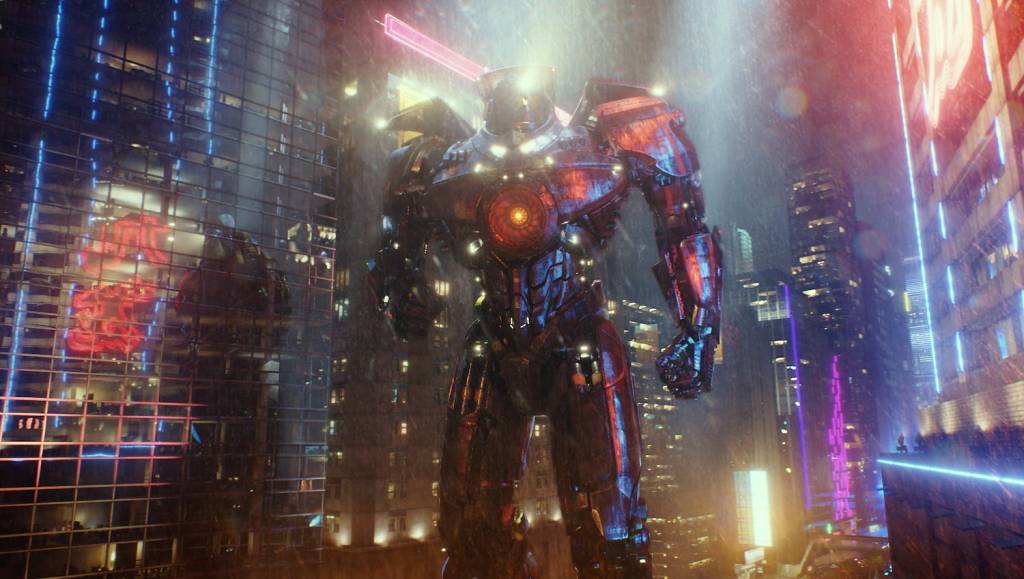
Pacific Rim (2013)
Guillermo del Toro’s Pacific Rim is, quite simply, the most gorgeous giant robot vs. Kaiju movie you’ll ever see. Take a little Godzilla, a little Ultraman, throw in some Robotech and Gundam for good measure, and then season it with del Toro’s quirkily beautiful style, and you get Pacific Rim, a blockbuster so strange and wonderful that it’s almost hard to believe that studio executives actually allowed it to exist in the first place.
Set in a near-future where Kaiju have been ravaging the world for the better part of a decade, Pacific Rim tells of how humanity fights back via mentally-powered, heavily armed giant mechs known as Jaegers. If this hasn’t sold you already, well, maybe Pacific Rim isn’t for you. On the other hand, it’s perhaps the ultimate evolution of the Toho, Toei, and other purveyors of Kaiju and Tokusatsu fare aesthetic, trading “man-in-suit” ridiculousness for some of the best special effects of the 21st century and treating a concept usually dismissed as inherently silly with reverence and love. – MC
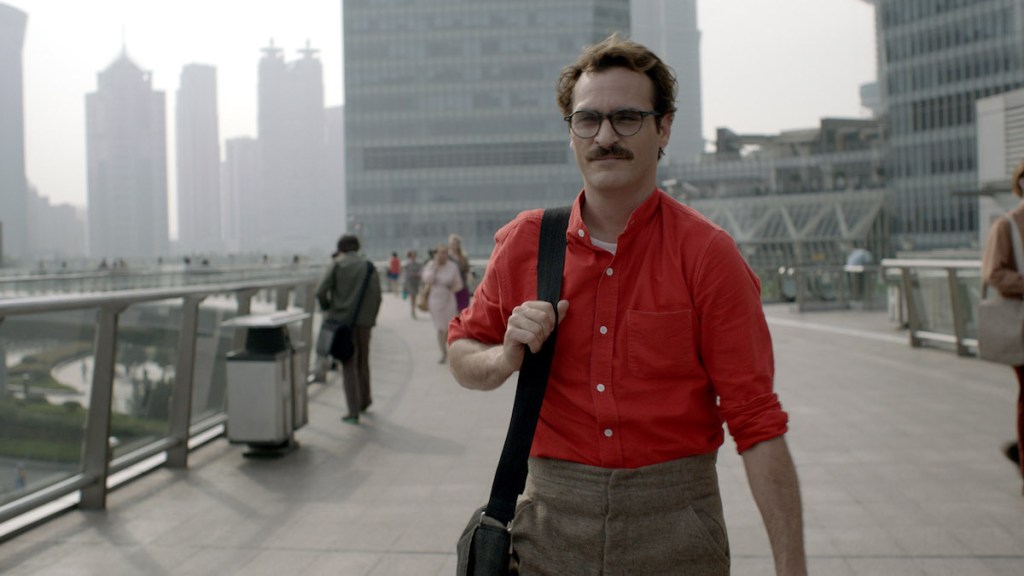
Her (2013)
Spike Jonze’s fourth feature as a director (and first as a solo screenwriter) is a gentle, melancholy yet incisive look at human relationships in an age of encroaching technology. Introverted Theodore (Joaquin Phoenix, perfect) whose job is composing personal letters for people who are unable to do so themselves, is depressed and lonely after the end of his marriage with Catherine (Rooney Mara). When he installs a new operating system at home, a virtual assistant which he names Samantha (voiced by Scarlett Johansson) is programmed to evolve on its own, and soon Theodore and Samantha begin an intimate relationship, even as Samantha begins to advance beyond human comprehension.
More relevant than ever, Her presents Theodore and the other humans in the story (including Amy Adams and Chris Pratt, among others) as lost, unable to connect emotionally with each other in a world where technology continues to keep us isolated. The love story between Theodore and Samantha (with Johansson doing excellent voice work) is believably developed, and Samantha’s final stages of development hint at unknown realms of consciousness we can only guess at. This is a marvelous, sad, and moving work of original science fiction from a filmmaker who’s been absent for too long. – DK

Under the Skin (2013)
Sometimes sci-fi is the perfect place to explore strange new worlds, alien races, and future technology. Under the Skin does the opposite. In viewing humanity through the eyes of Scarlett Johansson’s murderous extra terrestrial, it’s us who are strange. Jonathan Glazer’s unique arthouse masterpiece, based on Michel Faber’s novel, was almost 10 years in the making. Shot around Scotland, Johansson plays a mysterious female who seduces men, luring them into her van. Many of the men she entraps weren’t actors, but civilians caught on hidden cameras in the van and only told they were in a movie afterward. The process lends a realness that adds to the movie’s inherent strangeness. We’re not looking at how we think we might behave, but how real people actually do behave.
Under the Skin is rich and complicated, and it’s an astonishing accomplishment, a movie that captures the idiosyncratic beauty of humanity through beans on toast and Tommy Cooper, and the tragic and illogical nature of love through a harrowing sequence on a stormy beach, and the cruelty that humanity is capable of through a final brutal beat. Never has the familiar felt so truly alien. – Rosie Fletcher
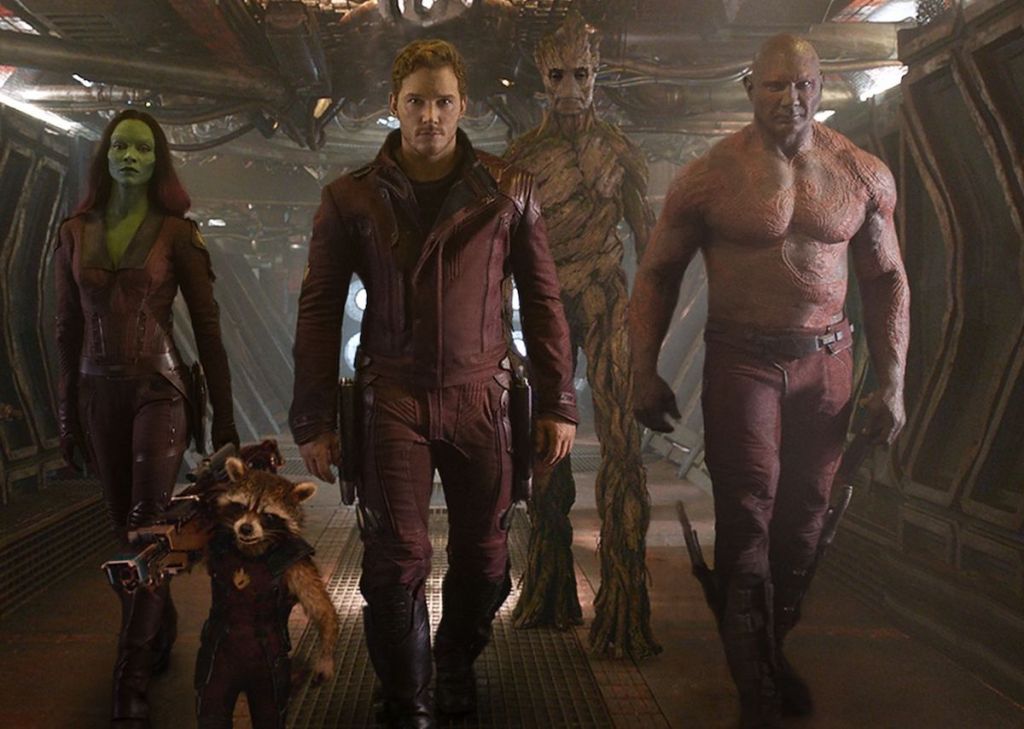
Guardians of the Galaxy (2014)
Throughout the wildly successful run of the Marvel Cinematic Universe’s 27 films, very few directors have been given free reign to execute an especially stylish vision. The MCU is about telling stories well and efficiently, but “style” is occasionally sacrificed on the altar of “story.” Then along came James Gunn with the first Guardians of the Galaxy movie, a film so vastly different from the rest of the MCU’s output that you almost wouldn’t believe it was part of the same franchise.
Gunn gave fans a genuine, old-fashioned space opera with the kind of lived-in sci-fi aesthetic beloved by fans of the original Star Wars trilogy and Tom Baker-era Doctor Who with more than a dash of color that wouldn’t have felt out of place in Mike Hodges’ Flash Gordon. As if that weren’t enough, Gunn put together one of the most memorable soundtracks of recent years, full of AM radio staples, power pop, and glam rock…and made sure there was an in-story reason for these songs to be playing on the interior of spaceships. Sure, it’s packed to the brim with Marvel Comics characters, locations, and concepts, but before this film, Groot, Rocket, Gamora, Drax, and Star-Lord weren’t exactly household names. Well, they sure are now, all thanks to this wonderful slice of sci-fi, with nary a superhero in sight. – MC
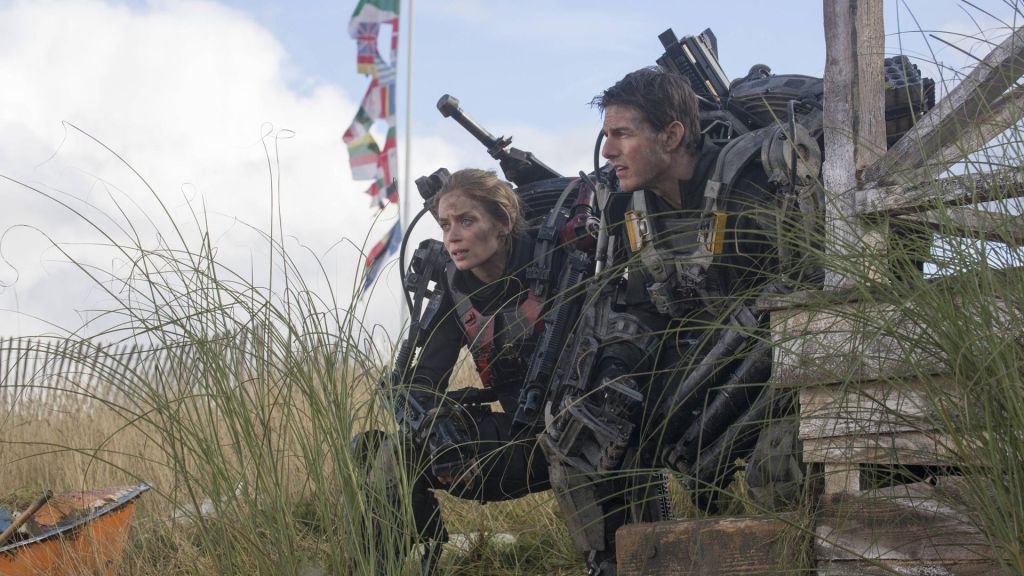
Edge of Tomorrow (2014)
Time loops are nearly always a character goldmine for the sci-fi genre, and Edge of Tomorrow is no different as it forces U.S. Army Major William Cage (Tom Cruise) into refining his mental and physical strength over countless loops in the midst of a futuristic battle to save the Earth from crafty aliens. Doug Liman’s risky movie ended up being a cult hit from the pen of Christopher McQuarrie, and while the movie’s conclusion was written during filming and is often considered the most underwhelming part of what is otherwise an action-packed sci-fi gem, it’s a treat to see Cruise playing against type as the hapless Cage, with Emily Blunt’s heroic Sgt. Rita Vrataski relentlessly putting the screws on him until he’s worthy. – KH
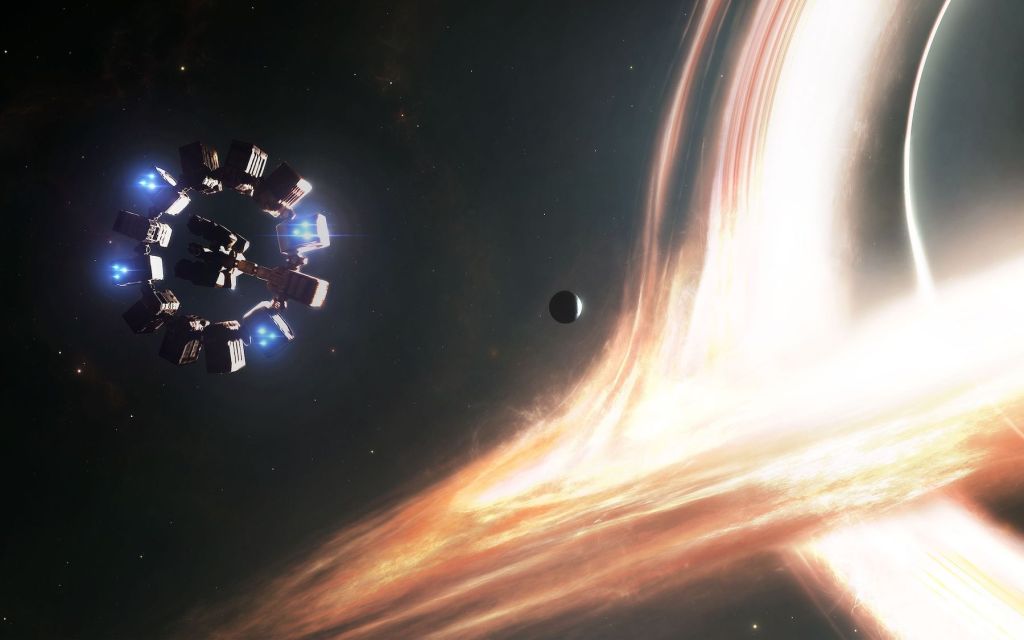
Interstellar (2014)
There’s a strange haunting quality to Christopher Nolan’s space epic that lingers on nearly a decade later. As its enigmatic filmmaker’s most heartfelt and sentimental movie, Interstellar bends time and gravity itself—and even educated millions about the theory of relativity—in order to talk about the love between fathers and daughters.
There’s of course more going on in Interstellar than just that. This is a secular end times myth which imagines a future where humanity is forced to save itself by adapting to life among the stars, and crafts that idea in an old-fashioned adventure that would do Jules Verne proud. Here we have a collection of scientists who are steeped in the scientific research of our day (the film even correctly predicted what a black hole would look like) going on a wild quest where their kids get older but they stay the same age. How fitting Nolan cast Matthew McConaughey.
Also, that Hans Zimmer organ score wrapped in religiosity is still one of the best filmic symphonies in this century. – DC
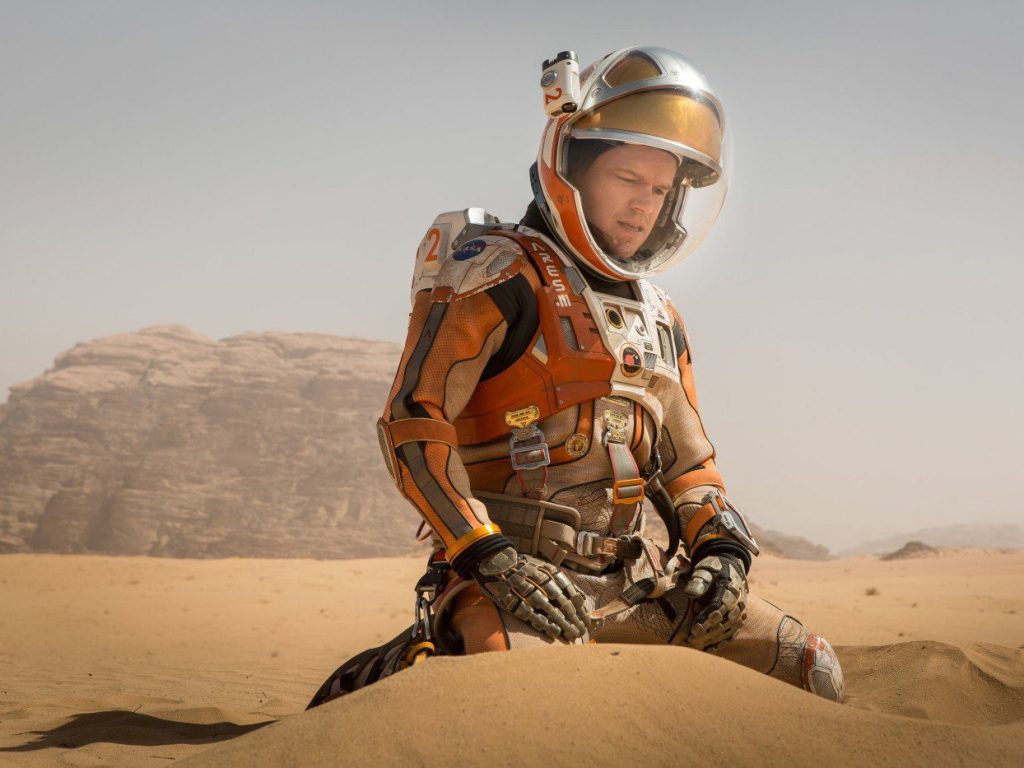
The Martian (2015)
Ridley Scott was back at the top of his game with this highly believable story of an astronaut stuck on Mars. The film is based on Andy Weir’s novel of the same name, and it features Matt Damon as Mark Watney, the astronaut abandoned on the red planet when his team assumes he died following a disaster. Now Watney must get a signal to Earth to show he’s still alive and find ingenious ways to survive long enough for a potential rescue mission to reach him.
There’s lots of fascinating science here, including explorations into how things would actually work in the atmosphere of Mars, and NASA was consulted in order to get elements of space travel correct. The detail is fascinating but the resilience of the human spirit is at the heart. It’s an old-fashioned story of resourcefulness and bravery, and we are with Watney through all the highs and lows of his quest to survive, while to his team mates trying to save him and the public back on Earth he’s a symbol of hope. It’s a clever, at times funny, and extremely emotionally satisfying film with a career best performance from Damon. – RF
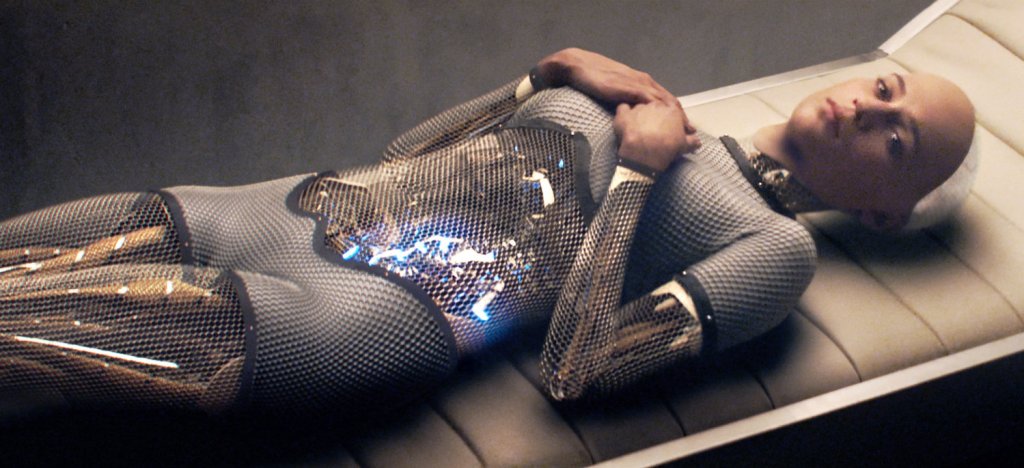
Ex Machina (2015)
A machine achieves sentiency. It’s one of the pillars of the science fiction genre since at least Metropolis. Yet it’s arguable no sci-fi has gone to the lengths of imagining the difficulty of achieving (and thereby proving) artificial intelligence that Alex Garland’s Ex Machina embarks on. Practically a parlor room drama between a programmer (Domhnall Gleeson), a mad tech bro genius (Oscar Isaac in one of his grooviest roles), and his creation, Ava (Alicia Vikander), this movie strips its elements down to the narrative basics and reaches back to an era where mood and aesthetics outweighed plot or special effects.
To be sure, Vikander’s Ava is still a technical wonder. She’s encased in an Oscar winning design by Andrew Whitehurst that is both feminine and frightening. But it’s her performance that invites true scrutiny and debate, much as Gleeson and Isaac’s modern day Prometheuses argue over the merits of AI. It’s in those long conversations, and the pregnant pauses between them where the full implication of an AI future is considered, that Ex Machina burrows under the skin and makes you wonder if there is bone or metal beneath. – DC
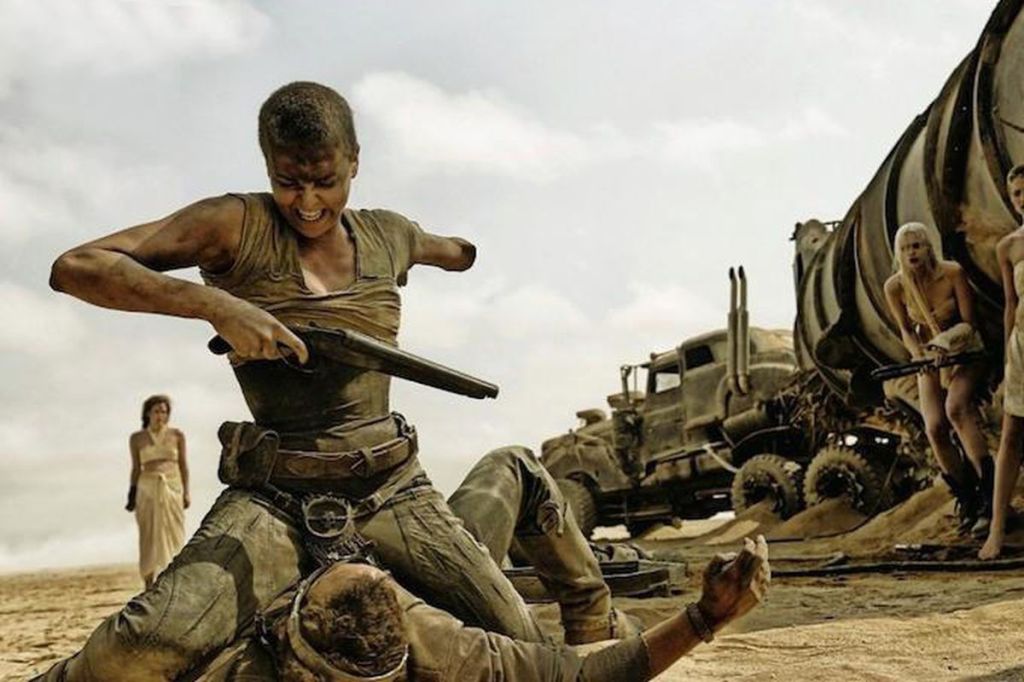
Mad Max: Fury Road (2015)
The Mad Max movies are often thought of as action films, and with good reason. But it’s worth noting that they are also a remarkable series of stories set in a fully developed, consistently engaging post-apocalyptic world as imaginative as anything we’ve seen in films more often referred to as sci-fi. All of which makes the franchise not just one of the great action properties but also one of cinema’s best sci-fi sagas.
That is why director and co-writer George Miller’s return to the world of Max Rockatansky was so highly anticipated; here is one of the rare directors who gets the combination of action and sci-fi right. And make no mistake, his long-awaited fourth film in the cycle, Mad Max: Fury Road, was a triumph in every way and a towering masterpiece in both genres. It expanded both the world and journey of Max (now played by a taciturn but still magnetic Tom Hardy), added a relevant, impressive and multi-dimensional new character in the form of Furiosa (a magnetic Charlize Theron), and delivered one stunning sequence after another, right up to its mind-blowing final chase.
Mad Max: Fury Road is genre fare, to be sure, but it’s a magnificent example of the kind of immersive, senses-enveloping, imagination-stretching storytelling that blockbuster cinema and a director like Miller can do best. Its themes, particularly about the patriarchal traps always placed around women, its imagery, and its sheer kineticism never get old or mundane, and its artistry nearly transcends itself. It’s a stone cold classic. – DK

Colossal (2016)
Sometimes Gloria (Anne Hathaway) is a monster when she’s drunk. Simultaneously, an actual Kaiju-sized monster terrorizes the citizens of Seoul, South Korea. This is the hook for Nacho Vigolondo’s comedy sci-fi which is a whole lot more emotional and nuanced than it looks at first glance. Hathaway’s Gloria is a woman who’s having a bit of a life hiccup when the story starts, returning to her hometown to sort things out. There, she hangs out in a bar with a former friend of hers, Oscar (Jason Sudeikis), eventually getting a job at that old watering hole. For a time, life is sweetly on hold, but when things begin to grow toxic with Oscar (hard to believe that Ted Lasso can play an a-hole, but he really can), the aforementioned Kaiju also starts causing mass devastation in Seoul.
Gloria soon discovers that if she stands (drunk or otherwise) on a certain playground at dawn, she can control the monster. Her bad choices have been made manifest. Thus begins Colossal’s true sensitive study of casual alcoholism with cracking central performances and the eye of a vastly underrated director. – RF
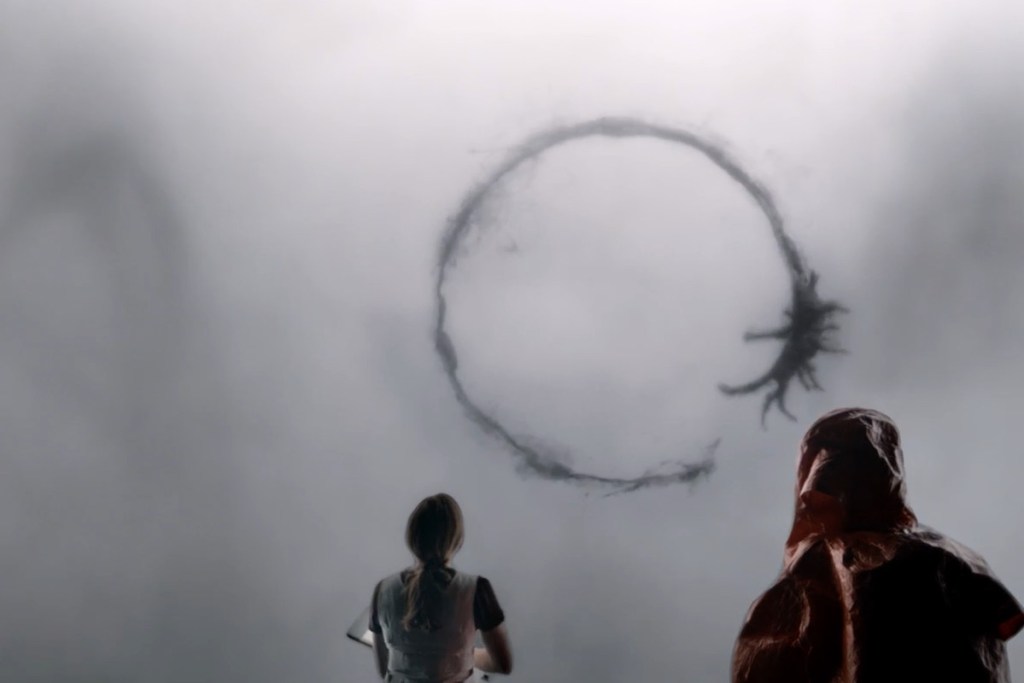
Arrival (2016)
Based on the Ted Chiang tale “Story of Your Life,” Arrival details the first contact between human and alien life through the science of linguistics. Language professor Louise Banks (Amy Adams) is recruited by the government–after a dozen massive ships appear around the globe–to attempt to decode the aliens’ tongue, find a way to communicate with them, and learn what they want. But Banks, haunted by memories of a terrible tragedy in her life, discovers that the aliens’ language unlocks her own mind in ways that she couldn’t have foreseen.
Once again, director Denis Villeneuve (working with a script by Eric Heisserer) displays his knack for taking cerebral, literary sci-fi and turning it into a compelling, thrilling, and ultimately deeply moving theatrical experience. Arrival adds a few cinematic wrinkles–some action, a world “crisis” surrounding the appearance of the aliens–but stays true to its mind-bending premise and incredibly profound themes of loss, memory, grief, and life choices. Filmed science fiction has rarely been better. – DK
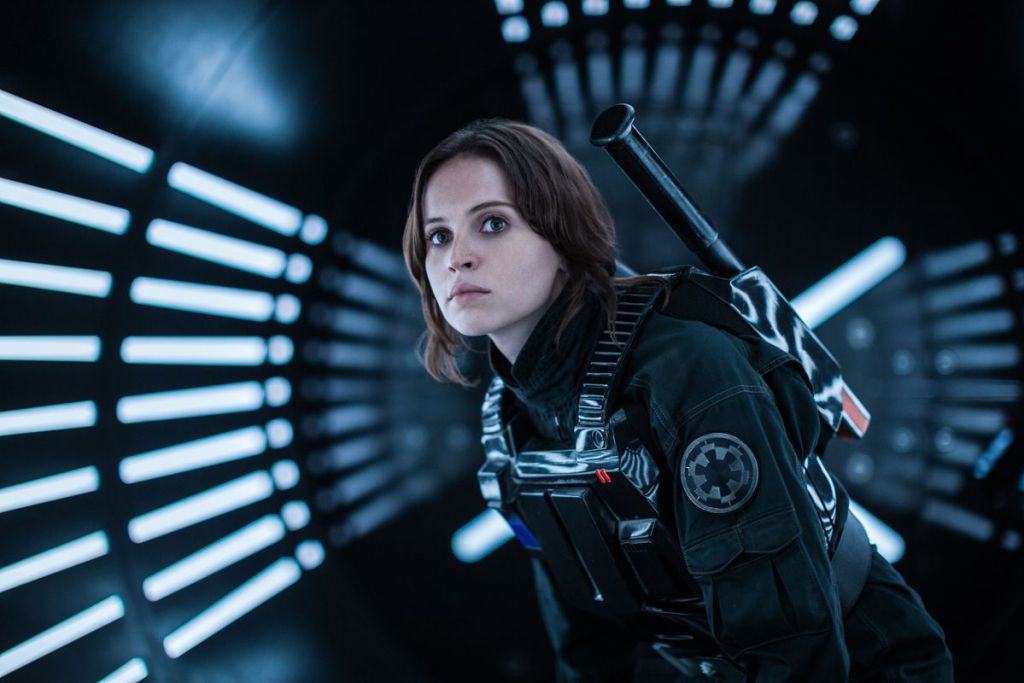
Rogue One: A Star Wars Story (2016)
Before we had a proper term for “legacy sequels” in 2012, Disney was busy bringing Star Wars back to the big screen. The studio’s plan? Return to the franchise roots established all the way back in 1977. The result was 2015’s The Force Awakens, a movie that felt like something of a retread of A New Hope at the time, and only glaringly more so by the end of the Sequel Trilogy. And for its follow-up next trick, Disney once again revisited the A New Hope well, but this time with a prequel film, 2016’s Rogue One, the story of the rebel agents who stole the Death Star plans, aka the MacGuffin from the original film. Overall, it’s a much better movie and arguably does a better job at celebrating George Lucas’ legacy than the carbon copy from 2015.
Although designed to evoke familiar territory, the film directed by Gareth Edwards, and with a helping hand from filmmaker Tony Gilroy, still felt like a serious gamble at the time. Could Rogue One, a movie set mere days before A New Hope, step out of its predecessor’s shadow and do something new with the franchise?
Well, by its shocking third act, it had. Billed as a true war movie set in the galaxy far, far away, Rogue One presents a grittier vision of this universe than we’ve ever seen before where rebel spies like Diego Luna’s Cassian Andor can exist along morally gray lines as opposed to the black and white morality of the Original Trilogy. The result is a movie that’s more layered and complex than your usual Star Wars fare, anchored by an emotional performance by Felicity Jones as unlikely hero Jyn Erso and Donnie Yen as the Force-worshipping Chirrut Imwe. And while the film drags a little in the middle, the third act wraps things up with a huge battle in space and on land that both recaptures the spirit of classic Star Wars battles and showcases some new sights and sounds. – JS
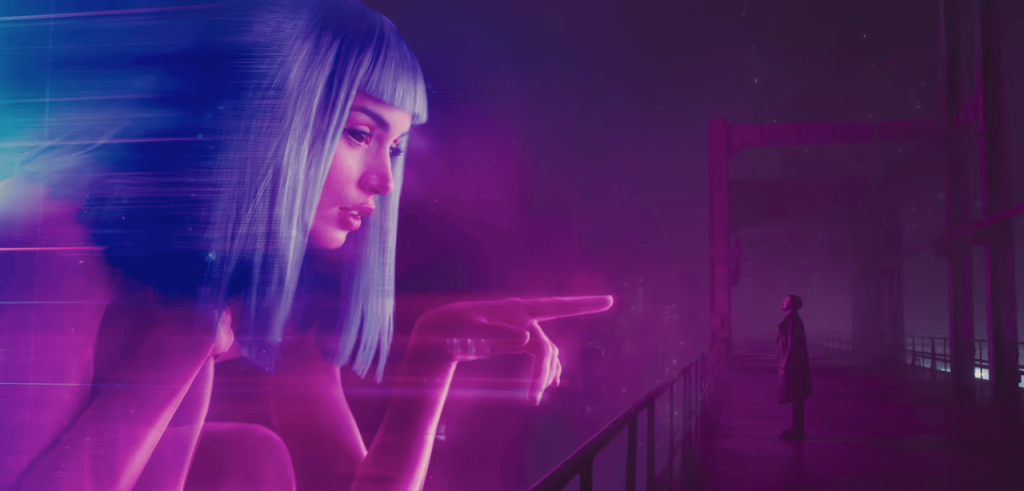
Blade Runner 2049 (2017)
By rights, Blade Runner 2049 shouldn’t exist. It’s a sequel to one of the sacred texts of sci-fi cinema; a cult classic so classy in its noir style that at a certain point Warner Bros. thought audiences would want more via this pricy “legacy sequel.” Given the box office of Blade Runner 2049 that turned out not to be the smartest gamble. Nevertheless, director Denis Villeneuve took full advantage of this opportunity to craft an arresting and entirely credible extension of Ridley Scott’s previous 1982 vision.
If Scott’s original movie is famously rain-soaked, Villeneuve’s film is of colder stuff—it’s literally snowing for much of the movie. He takes a similarly chilly disposition with a protagonist who knows he’s a replicant. Ryan Gosling remains adept at portraying a calm surface above a tidal wave of inner conflict. But it’s his relationship with a hologram played by Ana de Armas (who may or may not really love him) that gives 2049 a new level of despair. At a certain point in the future, even the androids have created castes of sentient A.I. One machine looks down on the race of another until they all merge and converge in the uncanny valley of ugly humanity. – DC
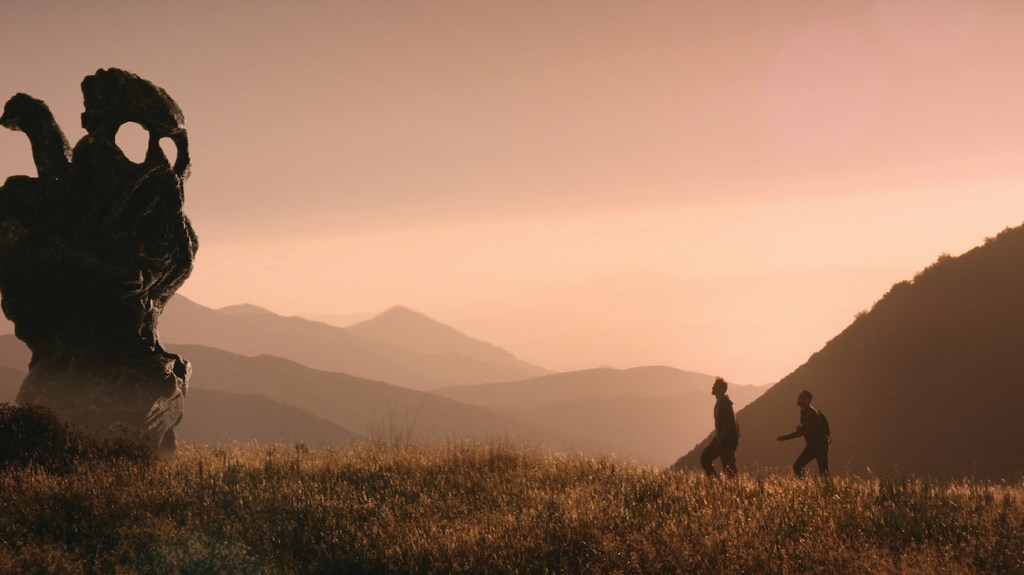
The Endless (2017)
Justin Benson and Aaron Moorhead’s third low budget sci-fi horror offering was a hit with critics when it first emerged in 2017 and quickly became an instant cult classic with many fans of the genre. An unassuming and surprisingly funny film, The Endless follows two brothers (played by Benson and Moorhead) who return to a cult they used to be members of when they were kids after they receive a strange video in the mail and fear that the cult may be on the verge of a mass suicide.
Needless to say, things are not quite as they seem, and the film slowly unwraps the mystery at the heart of this unique community by exposing the brothers to the kind of strange phenomena and rituals that will propel them toward a truly unexpected future. A must-see. – KH
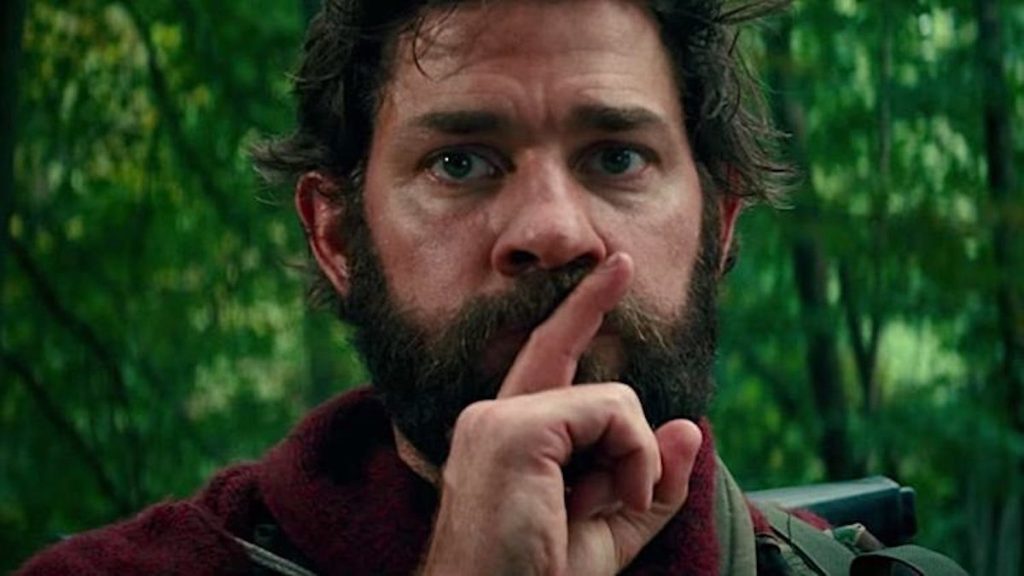
A Quiet Place (2018)
The old adage “children should be seen and not heard” has never been more true than in John Krasinski’s A Quiet Place. It isn’t a dismissive complaint from annoyed grownups; it is the key to survival against alien invaders. The first sound we hear in the film is a happy one, a kid’s toy space shuttle beaming waves of sonic joy on a bridge in the woods. It is the last noise the child will ever hear, and his helpless parents can’t even gasp in shock, or they will also be dragged into the fatal unknown. The silence is almost deafening in the 90-minute film, which only has about five minutes of dialogue. The first words are spoken about 40 minutes into the film.
Krasinski forces the audience to sharpen its focus by limiting the most visceral sense to express horror or relief. We are never told where the aliens came from or why they are attacking. We only know they are blind, and hunt by sound. The Abbott family has been communicating nonverbally for 89 days. This makes for pure motion picture storytelling, amplifying character development while muting the anguished distress. The film is about protection and survival.
Krasinski’s real-life wife Emily Blunt plays Evelyn, and together they bring a deeper fear to the movie than most science fiction thrillers. They are parents, their kids are in danger, she is pregnant, babies cry. Millicent Simmonds, who plays their daughter Regan, is deaf, which brings an emotional grounding in the film, making it somehow more immersive, subversive, frightening, and real. – Tony Sokol
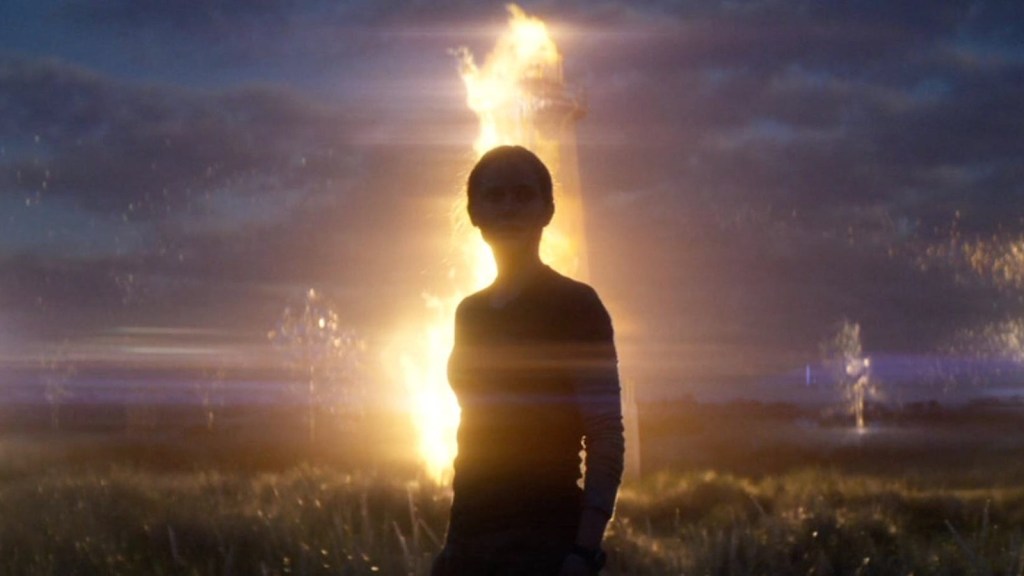
Annihilation (2018)
By the time writer and director Alex Garland turned his camera’s attention to the Jeff VanderMeer novel of the same name, he had already solidified his place as one of Hollywood’s great sci-fi filmmakers with his directorial debut Ex Machina, as well as for his writing of 28 Days Later and Sunshine. If Ex Machina was built on the age-old story of machines rebelling against their creators, Annihilation went for a completely different sci-fi trope: the scientific expedition gone terribly wrong. The film follows an all-women team of scientists as they journey into the mysterious Area X, a quarantine zone in the U.S. where biology has begun mutating after a meteor crashed into the region. As the movie opens, we learn that no other expedition has ever returned from Area X, giving the whole affair a sense of doom before the mission’s even started.
In truth, the movie is vastly different from the novel it’s based on, and has more in common with “The Colour Out of Space” by H.P. Lovecraft and the Andrei Tarkovsky film Stalker. As you’d expect from that excellent mix of influences, Garland’s film is imbued with an overwhelming sense of dread, as the scientists get closer to the cause of this biological anomaly where nature has evolved into something almost wholly alien. Natalie Portman and Jennifer Jason Leigh lead the cast as two scientists with much deeper motivations for wanting to enter Area X than simple scientific discovery. In fact, it’s through them, as well characters played by Oscar Isaac, Gina Rodriguez, Tessa Thompson, and Tuva Novotny, that the movie explores one of the story’s central questions: What drives someone to partake in a suicide mission in the first place? The answer, like the film’s chilling third act, may very well terrify you. – JS
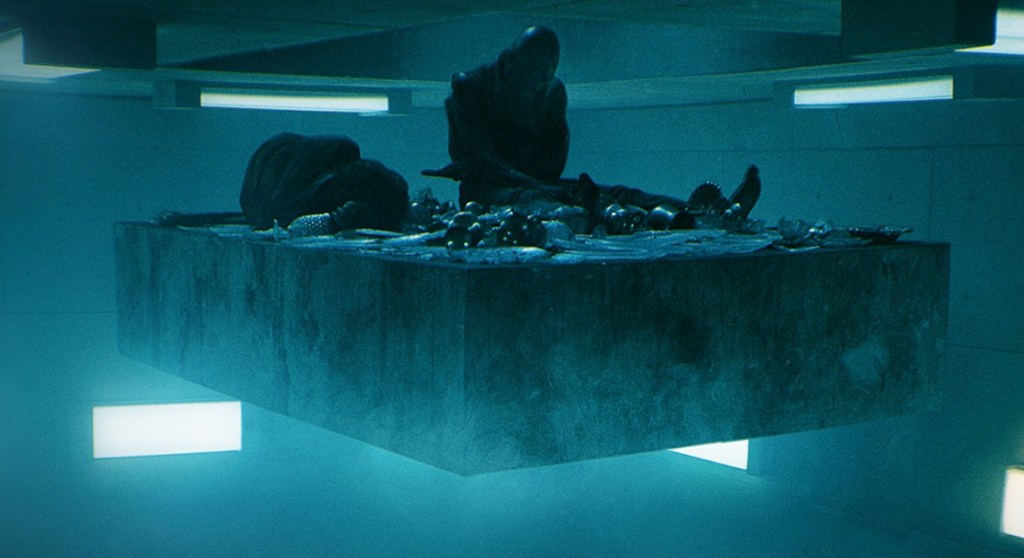
The Platform (2019)
The Platform made a huge splash on streaming after it was released and went on to become a word of mouth favorite. If you haven’t yet had the pleasure, we wholeheartedly recommend you go for it – just make sure you aren’t eating when you hit play.
The movie is a Spanish science fiction film with a jolt of horror, set in a large, nondescript tower that has over 100 floors. A hole runs through the middle of each floor, and a banquet table slowly descends through the hole, pausing to feed the residents. There is enough food for everyone if they share, but the greedy don’t, and so those on the bottom floors starve or cannibalize one another. As the residents are randomly switched between floors every month, they never know if they will get the opportunity to eat or not. Often grotesque, but utterly compelling, The Platform examines big themes about the nature of humanity and the lengths we will go to for a chance at equality in the face of a dystopian future. – KH
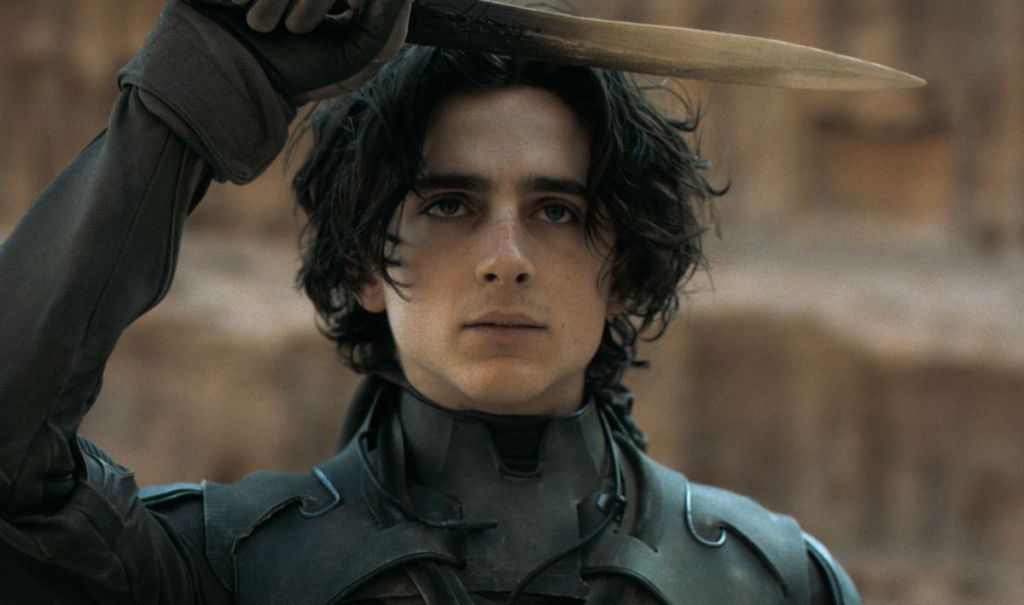
Dune (2021)
Dune has long been regarded as one of those “unfilmable” books, with Frank Herbert’s classic novel about humanity’s far future considered too dense and complex to truly translate to the screen. And indeed, it took three tries to get it right: following David Lynch’s disastrous 1984 feature and a 2000 Sci-Fi Channel miniseries that was okay but ultimately disposable, director Denis Villeneuve has finally gotten it right with his epic big budget film, an ambitious movie that captures both the vast cosmic scope and eerie personal mysticism that has made this material so compelling for nearly 60 years.
Working with an incredible cast that almost all fit their roles to a tee, Villeneuve has created a film that is largely faithful to the first half of Herbert’s book while bringing it to the screen with jaw-dropping visuals that seem to leap off the page. Splitting the book into two parts was both a wise decision and a risky one, as the hero’s journey hinted at in the first half gives way to something much darker in the second (not to mention Herbert’s sequels). How Villeneuve handles that remains to be seen, but in the meantime, Dune is a glorious, often stunning adaptation of a science fiction landmark. – DK
